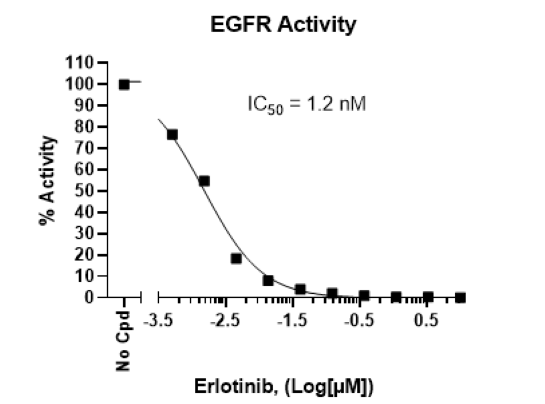Chemi-Verse™ EGFR Kinase Assay Kit
The Chemi-Verse™ EGFR Kinase Assay Kit is designed to measure EGFR (epidermal growth factor receptor) kinase activity for screening and profiling applications using ADP-Glo™ as a detection reagent. The assay kit comes in a convenient 96-well format, with enough recombinant purified EGFR (amino acids 668-1210), kinase substrate, ATP, and kinase assay buffer for 100 enzyme reactions.
Need us to run inhibitor screens or profile your compounds against EGFR? Check out our Kinase Screening and Profiling Service.
- ADP-Glo™ Kinase Assay (Promega #V6930)
- DTT (Dithiothreitol), 1M, optional
- Microplate reader capable of reading luminescence
- Adjustable micropipettor and sterile tips
- 30°C incubator
| Catalog # | Name | Amount | Storage |
| 40187 | EGFR, His-Tag, GST-Tag* | 1 µg | -80°C |
| 79334 | 5x Kinase Buffer 1 | 1.5 ml | -20°C |
| 79686 | 500 µM ATP | 50 µl | -20°C |
| 40217 | Poly-(Glu, Tyr 4:1) (10 mg/ml) | 50 µl | -20°C |
| 79696 | White 96-well plate | 1 | Room Temp |
*The concentration of the protein is lot-specific and will be indicated on the tube.
EGFR (epidermal growth factor receptor), also known as ERBB-1 and HER1, is the cell-surface tyrosine kinase receptor for members of the epidermal growth factor family. Its ligands include EGF, TGFα (transforming growth factor alpha), HB-EGF (heparin-binding EGF), betacellulin, amphiregulin, epiregulin and epigen. EGFR exists as an inactive monomer until it gets activated. Upon ligand binding it forms an asymmetric dimer, for instance with HER2 (human epidermal growth factor receptor 2), which induces autophosphorylation, creating binding sites for adaptor proteins such as GRB2 (growth factor receptor-bound protein 2) and/or CBL (Casitas B-lineage lymphoma). EGFR can bind to several adaptor proteins simultaneously and thus activate multiple positive and negative signaling pathways. Overexpression and/or hyperactivation of EGFR kinase is associated with several human cancers such as lung, glioblastoma (GBM), and epithelial tumors of the neck and head, being the most common mutation in GBM and breast cancer. Mutations in EGFR can result in constantly activated EGFR, allowing tumor cell proliferation and development of resistance to drugs. Its role in cancer has led to the development of anticancer therapeutics targeting EGFR. There are several clinically approved inhibitors, such as Erlotinib and Gefitinib, for the treatment of NSCLC (non-small cell lung cancer) and pancreatic cancer. In addition, several monoclonal antibodies have also been approved, namely Cetuximab. Patients that respond to treatment to anti-EGFR therapy tend to develop resistance later on, highlighting the need for further detailed studies into the role of this protein and new therapeutic avenues.
Nakamura J.L., 2007 Expert Opin. Ther. Targets 11(4):463-472.
Uribe MK., et al., 2021 Cancers (Basel) 13(11):2748.


